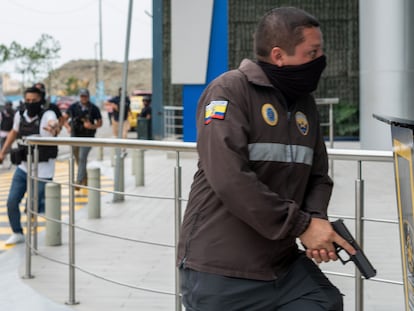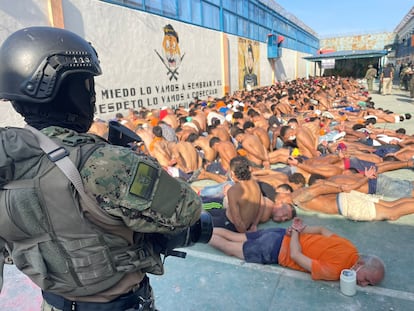From barbarism to abuse: The ongoing problem of Ecuador’s prisons
Inmates at Guayaquil’s Litoral penitentiary, the country’s most notorious prison, recount the humiliations they have been subjected to since the military took control of the facility
Ricardo’s face bears the indelible mark of H, a deadly cocktail of heroin and the toxic materials it has been cut with, such as cement and paint. His cheeks and shaved head are covered in pus spots. He has just walked out the gates of Guayaquil’s Litoral prison: now he is a free man who will not be woken up in the morning by shouts and insults, or with the fear that the military prison guards will torture him. He will be able to take a shower and go to the bathroom in private; eat decent food and not the inedible pasta that was thrown at him. For the first time in a long time, he wears trousers and shoes. He has shared a cell with tuberculosis patients and the most violent criminals on earth. But the worst abuse came at the hands of those who were supposed to be guarding him: “I have come out of hell,” he says.
An hour ago, Ricardo was at the prison gates, barefoot and handcuffed along with others waiting to be released. Family members watched anxiously from outside, peering through the metal bars that surround the Litoral penitentiary, Ecuador’s most notorious prison. These men are the latest to be leaving an institution where more than 300 people have been killed in the last three years. Since the Armed Forces took control of the country’s prisons last January at the request of President Daniel Noboa, inmates no longer kill each other; instead, a wide range of testimonies and investigations have revealed abuse and even torture is taking place inside.
Luis — not his real name — spent his 25th birthday in jail. He was arrested for using drugs in a police roundup. His mother touches his arms and feels his belly under his loose T-shirt. “He’s skinny,” she says. Luis was one of the more than 18,000 people picked up since the state of emergency declared by the Noboa government came into effect. No sooner had he set foot in prison than the abuse began. “The military beat us as soon as we entered,” he explains. “They use whips, cables, sticks and water pipes; they would come in and beat us up for no reason.”
According to Luis, sometimes the guards select prisoners to take to a hut to continue with the beatings. “They waterboarded us,” he says referring to a form of torture condemned by international human rights organizations. “They throw you on the floor, put a rag on your face and pour water on you.”
Mealtimes are bad. Various testimonies maintain that the guards take the prisoners out to the yard, force them to sit in a row, with their heads down and their hands on their necks. Sometimes, they are made to pray:
Lord, we thank you for this food
Bless the hands that prepared it
Take it to the most needy
To the table of my command
To the table of my guide
To the table of the policeman...
Three meals a day are provided, but they can’t always eat, depending which guards are on duty. “Some would make us swallow our food without chewing and if we didn’t do it quickly, they would give us a whipping or take it away.” A time frame — sometimes one minute, sometimes 30 seconds — would be imposed. “We swallow the food while they count: 20, 15, 10... We put the bowl on the floor and raise our hands,” says Luis.
Luis’ version of events coincides with that of Ricardo. “We ate quickly because they threw gas at us in the middle of the courtyard,” says the former inmate as he greets his children at the exit.
The Guayaquil Human Rights Committee (CDH) has identified that these practices not only occur in the Litoral penitentiary, but also in the Cotopaxi and Machala prisons. “The Armed Forces withhold the food, let it rot and then give it to the prisoners,” says Fernando Bastias, a CDH lawyer. Relatives of prisoners are currently in court in Quito to demand the state guarantee food for about 11,000 inmates of 20 prisons, who had not been receiving nourishment for days due to a government debt of $30 million to the supplier, unpaid since November 2023.
Although the food crisis in prisons began officially in May, prisoners in the Turi jail, in Cuenca, had been given just cookies and a small container of juice once a day for three months prior to that, according to a report by the Ombudsman’s Office. In charge of preventing torture in the country, these provincial entities are the only ones who have been allowed to enter the prisons by legal mandate.
The Ombudsman’s Office has been alerting the authorities to what has been happening in a number of prisons since February. “We reported that the prisoners were not receiving the food that corresponded to their basic caloric needs,” says Rodrigo Varela, coordinator of Human Rights Protection at the Ombudsman’s Office. No action was taken. During visits made since the state of emergency came into force, they have gathered accounts of torture similar to those described by Luis and Ricardo in different prisons across the country. “We have sent all this information to the Prosecutor’s Office, which will have to determine whether or not there was torture, and whether or not the guards involved committed torture,” says Varela.
With visits banned for five months at the Litoral penitentiary in Guayaquil, prisoners have been isolated. No phone calls have been allowed and information is scarce. “We ask about them and they tell us that they are there, but we have no assurance that they are alive,” says a woman who waits anxiously with a group of others hoping for a glimpse of their loved ones. Faced with the authorities’ silence, they stand outside all day hoping those released will tell them what is happening within. They have learned of the torture, that there is also an outbreak of tuberculosis, that the sick with serious diseases are not treated in time and that most of them have scabies or abscesses on their skin.
Sign up for our weekly newsletter to get more English-language news coverage from EL PAÍS USA Edition










































